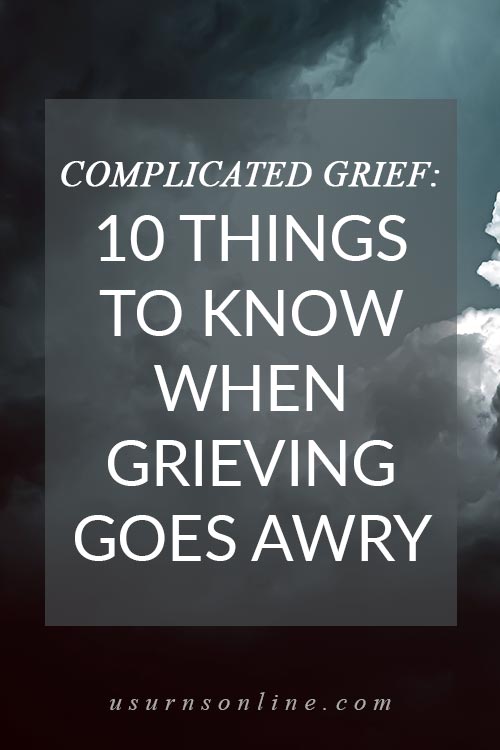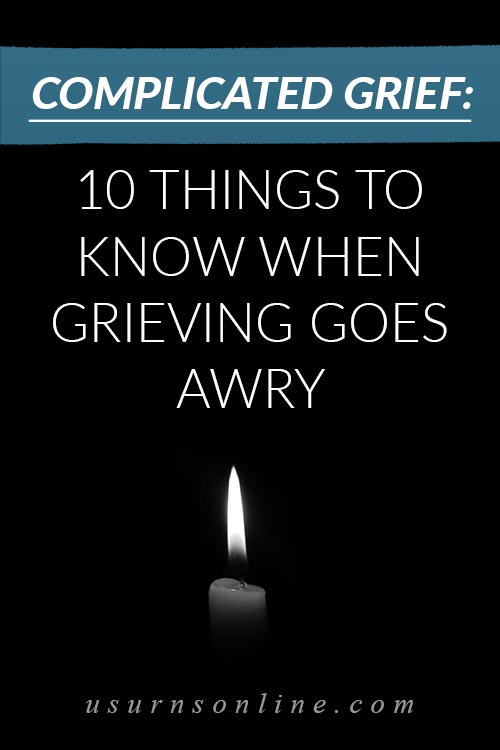Today’s discussion will cover complicated grief. This is a type of grief that almost always relates to the death of someone you knew and loved deeply.
Being exposed to grief is something that will happen to us all. Whether you are grieving the loss of a loved one, the loss of a job, the loss of a friendship, or even the loss of a dream, we all grieve at some point.
Sometimes, however, healthy “normal grief” can give way to a deep, persistent, and truly complicated grief.
Read on to learn more about this topic.
What is Complicated Grief?
Complicated grief is when the anguish over the death of a loved one becomes so severe and long-lasting that you have trouble resuming and improving your life. Sometimes this type of grief is referred to as Complex Bereavement Disorder or CBD.
Complicated grief can become disabling. Taking over your life with its severity, this is a persistent and emotionally traumatic experience that will require counseling. The medical community has recognized CBD as being a treatable condition.
What is the difference between complicated grief and normal grief?
There aren’t too many differences between complicated grief and normal grief in the first few months. As time progresses, the weight of normal grieving will begin to lift. You will be adjusting to the new life that has been forced upon you. This is where the differences between grief and complicated grief start to come to light.
Your grief won’t be lessening as it turns from normal grief to complicated grief; in fact, it deepens and gets a stranglehold on you. Complicated grief will affect you physically as well as psychologically.
Sadly, there are many types of complicated grief: chronic, delayed, exaggerated, and masked (read more about these here). The good news is that there are various ways to heal from these trials.
Related: Mourning a Death: How to Grieve Well
Urns Made in the USA
What are the symptoms of complicated grief?
Normal grief “typically” will start to abate after 12 months, although there truly is no timeline for grief. The journey of grief is personal, and traveling it at your own pace is important.
When complicated grief sets in, these are some of the frequent symptoms you may experience.
- Suffering from grief “triggers.” Something that might seem insignificant to anyone else sets you off. At times, it might set you back in your grieving process.
- Developing a pervasive fear of death. Your thoughts and conversations revolve around death and loss, and begins to take over your daily life.
- Manifesting some of the same symptoms of your loved one. Those who suffer from CBD sometimes take on the physical symptoms that their loved one suffered at the end.
- Detachment from life. You may no longer engage in the activities that you and your loved one enjoyed. You don’t want to include friends or family in any activities, either.
- Intensely holding on to your loved one. This could mean you never clean out your loved one’s possessions. Keeping everything in a “shrine-like” setting. Hanging onto clothes, perfumes/colognes, even keeping things you never liked before. Most people hold on to a few keepsakes, routines, or traditions that ‘keep their memory alive’ – that is normal and healthy. But this is an unhealthy exaggeration of memorializing the decedent.
- Intensely avoiding reminders of your loved one. Alternatively, sometimes those who suffer from complicated grief avoid or tune out the reality of their loved one’s death. This might include the inability to speak of your loved one, visit their grave, or unable to discuss your loved one’s passing.
- Anger, sadness, depression, guilt, low self-esteem, even frequent and uncontrollable bouts of crying. Everyone goes through these feelings while grieving, but there is trouble when these emotions continue unabated or even increase in frequency and intensity.
This is a shortlist of some of the symptoms you may see in yourself. If just one of these is present, it could be time for you to seek some professional help.
What is the treatment for complicated grief?
Thankfully, you have multiple options to seek in treatment for complicated grief.
- Bereavement Counseling is available and impressive in the headway it is making. Recognizing complicated grief as a condition that affects about 7% of people has brought it into the light.
- Talking to friends or family about your grief can help you move forward. Sharing tears, memories, and plans for the future is a healthy way to combat your grief. Including a therapist might be the way to proceed.
- Developing new, healthy habits will help your metabolism and endorphins. Take up walking, running, cycling, or any healthy activity. Joining a group to exercise might be an option for you.
- Psychotherapy may be an answer to your complicated grief. Clinicians are trained to treat complicated grief, but unfortunately, there are no proven drugs to help with grief. You will be treated with similar techniques that are used for depression and PTSD.
When should I see a grief counselor?
Sometimes it is hard to admit we may need help or even realizing we need help. Trust your instincts. Ask those close to you. If you feel like you aren’t coming out of the abyss of grief, it is time to seek help.
Check your local listings. Remember, it might not always be a fit with the first counselor or even the second. Keep working at finding a person who can help you through this rocky journey.
As a friend, how can I help someone with complicated grief?
First, don’t diagnose them yourself. Healthy grief may not look normal to you, so it is not advisable to assume that your friend’s mourning is “worse” than it is. Let them grieve.
Second, just be there for them. Here are 83 practical ways to show comfort to someone who is grieving.
Third, watch carefully for CBD warning signs and use wisdom when counseling them to get help. If you think your friend may be suffering from complicated grief, start by offering to go with them to a grief support group or driving them to a grief counselor.
Approach it from the perspective that everyone mourning a death can benefit from a support group or grief counseling (which is true!). Allow the counselor to identify complicated grief.
10 Things to Know About Complicated Grief
Complicated grief can be hard for you to understand when you are going through it. The pain can be physical as well as emotional. Read on to learn some interesting points that could pertain to you.
1. Complicated grief comes in various degrees.
Persistent grief can disrupt your day-to-day activities, extend the time you are grieving, and cause ongoing depression. These are just a few of the signs you may display.
2. Complicated grief can mess with your mind.
Deep-set emotions may get you thinking about irrational thoughts. Suicide is a thought that may surface. Get help immediately if this is you.
Help is always available at the National Suicide Prevention Lifeline: dial 988.
3. Complicated grief can display symptoms of PTSD and should not be taken lightly.
PTSD is more likely to follow a harrowing experience, such as a car accident or other violent death. There is treatment for episodes such as this.
Whether complicated grief happens can depend on how you cope with stress, trauma, and loss. If you are already suffering from depression, anxiety disorder, or personality disorders, the chances increase for complicated grief to set in.
4. Complicated grief starts the same as normal grief.
In normal grief you experience the loss, work through your grief, learn to live a new life and start to build new relationships.
Normal grief can be very difficult and intense, but will fade over time. Complicated grief does not fade but tends to worsen with time. It will not let you move ahead.
5. Approximately 2.5 million people die each year; about 2% of all deaths are children.
Regrettably, if you have suffered through the trauma of losing a child, you are more likely to endure the effects of complicated grief. It is just not natural to outlive your child, and it alters people who go through it.
As a funeral director, I have never seen anyone suffer more than a parent who has lost a child. Whether it is an expected death or not, the grief is so much deeper than any other death.
6. Hallucinatory experiences may happen when you are going through complicated grief.
You may think you see or hear your loved one. These are referred to as “grief hallucinations.”
Carrying on a conversation with a deceased love one is not unheard of. A study has shown that 80% of the elderly who have lost a spouse may experience hallucinations.
Bereavement hallucinations can make you feel like you are going insane, but you are not. These occurrences happen and have been widely documented.
7. Friends and family, therapy, or all of the aforementioned?
It is important to understand that friends and family are a wonderful and natural support system. When it comes to complicated grief, however, they may not be enough to talk you through it.
Once complicated grief sets in, it is time for a professional to help you. Keep those communication lines open with family and friends, but include your therapist as often as he/she recommends.
8. Watch out for behavioral changes.
At times while working through grief, you may find your behavior is changing.
You might become reckless, taking chances with your body or health. You might become more impulsive, perhaps putting yourself in dangerous situations and wishing/hoping to die.
Be aware of these behaviors so you can remedy them as quickly as possible.
9. You may be the last to know.
There are moments in life that we are oblivious to the most obvious. If friends and family mention issues that they may be witnessing concerning you, don’t dismiss them.
Remember, they love and care about you and only want what is best. Don’t let your pride or ego dictate your need for help. The best of us need a hand now and again.
10. Staying healthy really helps.
It is important to take care of yourself at all times, but especially when your mind and body are under heavy stress.
One good way to fight off complicated grief (or even the possibility of it) is by developing good habits. Resting, exercising, eating properly, quitting smoking, and remembering that you matter. All these things are more important than ever.
It is fine to focus on yourself right now – you might feel selfish but taking care of your body and mind is very important.
Other Types of Grief
Grief comes in a variety of categories. Each and every type of grief displays its own symptoms.
- Anticipatory Grief
- Normal Grief
- Delayed Grief
- Complicated Grief
- Disenfranchised Grief
- Chronic Grief
- Cumulative Grief
- Masked Grief
- Distorted Grief
- Exaggerated Grief
- Inhibited Grief
- Collective Grief
- Abbreviated Grief
- Absent Grief
We all experience loss – the loss of a loved one through death, or the loss of something important to us such as a job, relationship, physical ability, and so on.
When these things happen, we grieve. So eventually we will encounter at least one of these categories of grief.
Learn more about other types of grief here.
Read Next: Death Quotes About Losing a Loved One, Grief, & Comfort
Pin It




